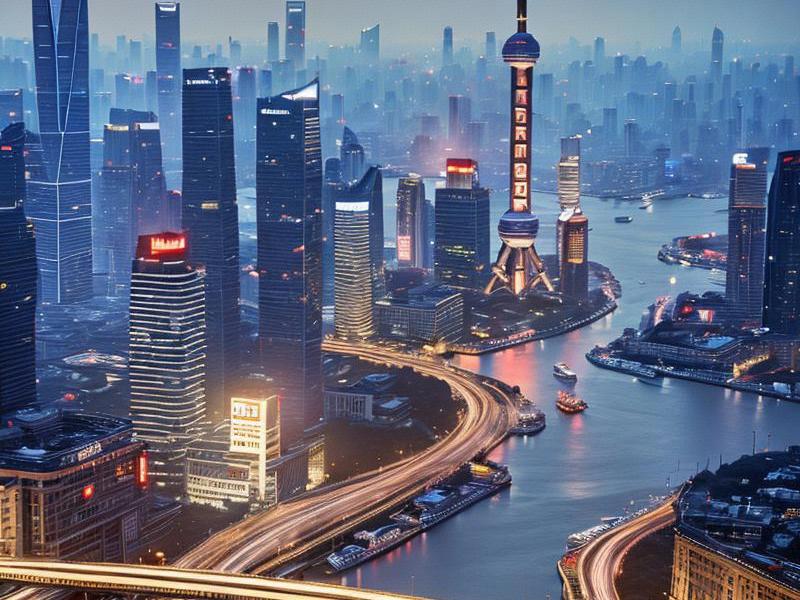This article delves into the multifaceted aspects of Shanghai, exploring its role as a global metropolis that seamlessly blends tradition with modernity. It highlights the city's rapid urban development, economic prowess, cultural vibrancy, and its status as a beacon of innovation in China and beyond.

Shanghai, the largest city in China, is a vibrant metropolis that has been at the forefront of China's economic and cultural transformation. Known as the "Pearl of the Orient," Shanghai is a city where the old meets the new, creating a unique blend of tradition and modernity. This article explores the various facets of Shanghai, focusing on its urban development, economic significance, cultural richness, and its role as a global hub for innovation.
Urban Development in Shanghai
Shanghai's urban landscape is a testament to its rapid development over the past few decades. The city has undergone a remarkable transformation from a traditional port city to a global financial and commercial center. The iconic skyline of Shanghai, dominated by the Oriental Pearl Tower, the Jin Mao Tower, and the Shanghai Tower, symbolizes the city's modernity and ambition.
The Pudong area, once a rural region, has been transformed into a bustling financial district. The Lujiazui Financial District is home to some of the world's tallest skyscrapers and is a hub for international businesses. The Bund, on the other side of the Huangpu River, showcases a blend of colonial architecture and modern skyscrapers, offering a glimpse into Shanghai's historical past.
Shanghai's urban planning is characterized by its emphasis on sustainability and livability. The city has invested heavily in public transportation, with an extensive metro system that connects different parts of the city efficiently. The Maglev train, which connects Pudong International Airport to the city center, is a showcase of Shanghai's commitment to advanced transportation technology.
Economic Significance
爱上海论坛 Shanghai is one of the most important economic hubs in China and the world. It is the headquarters for many multinational corporations and a major center for finance, trade, and logistics. The city's port, the Port of Shanghai, is the busiest container port in the world, handling millions of tons of cargo annually.
The financial district of Pudong is home to the Shanghai Stock Exchange, one of the largest stock exchanges in Asia. The city is also a major center for foreign direct investment, attracting businesses from around the globe. Shanghai's economic success is driven by its strategic location, robust infrastructure, and business-friendly environment.
Cultural Richness
Despite its rapid modernization, Shanghai has managed to preserve its rich cultural heritage. The city is known for its traditional Chinese architecture, art, and cuisine. The Yu Garden, a classical Chinese garden, is a popular tourist attraction that offers a glimpse into the city's historical past.
Shanghai's cultural scene is vibrant and diverse. The city is home to numerous museums, theaters, and art galleries. The Shanghai Museum, one of the largest and most prestigious museums in China, houses an extensive collection of Chinese art and artifacts. The city's theaters host a wide range of performances, from traditional Chinese opera to contemporary theater productions.
Culinary tourism is another highlight of Shanghai. The city is renowned for its diverse and flavorful cuisine, which includes iconic dishes such as Xiaolongbao (soup dumplings) and Shengjianbao (pan-fried dumplings). The bustling food markets and night markets offer a wide variety of local delicacies, making Shanghai a paradise for food lovers.
爱上海最新论坛
Innovation and Technology
Shanghai is at the forefront of China's innovation and technology revolution. The city has established itself as a global hub for research and development, attracting top talent and investment. The Zhangjiang Hi-Tech Park is a major center for high-tech industries, including biotechnology, information technology, and new energy.
The city's commitment to innovation is evident in its smart city initiatives. Shanghai has implemented various technologies to improve urban living, including intelligent transportation systems, digital governance, and smart infrastructure. The city's focus on innovation has made it a leader in areas such as artificial intelligence, fintech, and green technology.
Shanghai's universities and research institutions are also playing a crucial role in driving the city's innovation ecosystem. Institutions such as Fudan University and Tongji University are known for their research and academic excellence, contributing to the city's reputation as a center of knowledge and innovation.
Global Influence
上海龙凤419社区 Shanghai's global influence extends beyond its economic and cultural significance. The city is a major player in international diplomacy and cooperation. The Shanghai Cooperation Organization (SCO) is an intergovernmental organization that promotes regional security and economic cooperation among member states, including China, Russia, and several Central Asian countries.
Shanghai is also a host city for numerous international events and conferences. The city has successfully hosted major events such as the World Expo in 2010 and the Asia-Pacific Economic Cooperation (APEC) summit. These events have enhanced Shanghai's global profile and strengthened its position as a hub for international dialogue and cooperation.
Challenges and Future Prospects
Despite its many achievements, Shanghai faces several challenges as it continues to grow and develop. The city's rapid urbanization has led to issues such as traffic congestion, air pollution, and housing shortages. Addressing these challenges requires innovative solutions and sustainable urban planning.
Shanghai's future prospects are promising, driven by its commitment to innovation, sustainability, and global cooperation. The city is expected to play a key role in China's Belt and Road Initiative, which aims to enhance connectivity and trade between Asia, Europe, and Africa. Shanghai's strategic location and economic strengths make it a vital node in this global initiative.
In conclusion, Shanghai is a dynamic and multifaceted city that embodies the spirit of China's modernization. Its rapid urban development, economic significance, cultural richness, and commitment to innovation make it a global metropolis of great importance. As Shanghai continues to grow and evolve, it will undoubtedly remain a beacon of progress and a symbol of China's aspirations on the world stage.